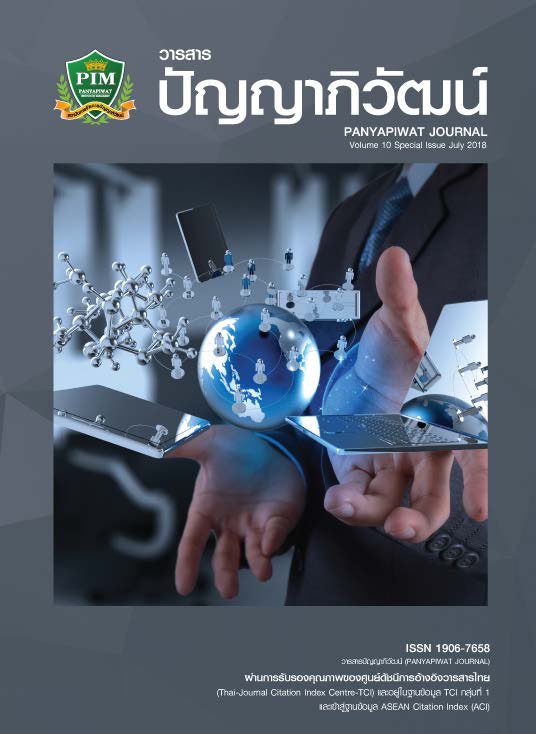CAUSAL FACTORS OF THE PROPER ONLINE GAMING BEHAVIORS OF LOWER SECONDARY SCHOOL STUDENTS
Main Article Content
Abstract
The purpose of this research was to study model of causal relationship that effect to the proper online gaming behaviors of lower secondary school students. The sample of 400 students was selected by Multi-stage random sampling. The research instruments were six level Likert Scale type of questionnaire, It was a measure of the cause and effect of proper online gaming behaviors. AMOS program was applied to analyze the data using Path Analysis technique.
The result revealed that the developed behavior model of the proper online gaming behavior of lower secondary school students is consistent with empirical data according to interactionism model and ethical trees theory in the proper online gaming behaviors depends on the psychological states the most (the attitude toward proper online gaming behaviors) followed by the psychological characteristics or features within them (future orientation and self control) and the situational factors (online family game controls) respectively. In addition, they have a direct influence on the proper online gaming behavior and sends psychological states as well (the attitude toward proper online gaming behaviors).
Article Details
I and co-author(s) certify that articles of this proposal had not yet been published and is not in the process of publication in journals or other published sources. I and co-author accept the rules of the manuscript consideration. Both agree that the editors have the right to consider and make recommendations to the appropriate source. With this rights offering articles that have been published to Panyapiwat Institute of Management. If there is a claim of copyright infringement on the part of the text or graphics that appear in the article. I and co-author(s) agree on sole responsibility.
References
Arbuckle, J. L. (2009). AMOS 22.0 User’s Guide. Chicago, IL: SPSS.
Bhanthumnavin, D. (1995). Tree theory, ethics and individual development. Bangkok: Promotion Academic Documents National Institute of Development Administration. [in Thai]
Bhanthumnavin, D. (2000).Ethical tree theory: research and development (2nd ed.). Chulalongkorn University Printing. [in Thai]
Bhanthumnavin, D. (2009). Principles and methods of document processing for excellence in behavioral research (2nd ed.). Bangkok: AA Public Company. [in Thai]
Bhanthumnavin, D. (2015). Antecedents of Mindful Risk-Taking Behavior in Secondary School Students: A Path Analysis Approach. Journal of Behavioral Science, 21(1), 75-94. [in Thai]
Biggins, O. (2009). Building Up the Virtual Community in Online Games and “Onlineaholics” Behaviour of Adolescents in Bangkok Metropolitan. Journal of the Internet, 23(70), 7-21. [in Thai]
Chuchom, O. (2014). Model of causal relationship and effect of teacher commitment. Research Report. Behavioral Science Research Institute, Srinakharinwirot University. [in Thai]
Chula Weekly. (2010). Explore the issue of children addicted to online games in Bangkok, almost 30% into the drugs adversely affect learning and health. The Journal of Chula Weekly, 53(35), 6. [in Thai]
Intune, S. (2009). Psychosocial factors and effects on stress management of reading behavior in adolescent students. M.Sc. (Applied Research Applied Psychology), Behavioral Science Research Institute, Srinakharinwirot University. [in Thai]
Linderman, R. H., Merenda, P. F. & Gold, R, Z. (1980).Introduction to Bivariate and Multivariate Analysis.Glenview, Illinois: Scott, Foresman and Company.
Magnusson, D. & Endler, N. S. (1977). Personality at the Crossroad: Current Issues in Interactionism Psychology. New Jersey: LEA Publisher.
Ministry of Public Health Department of Mental Health, Institute of Mental Health, Children and Teens. (2013). Chart showing percentage of children Game in Thailand. Retrieved November 25, 2017, from https://www.icamtalk.com [in Thai]
Pimthong, S. (2014). A Cross-Cultural Study of Psychosocial Factors Correlated with Sufficient Consumption Behavior of Students in Thailand and Malaysia. Research Report. Behavioral Science Research Institute, Srinakharinwirot University. [in Thai]
Pornnapadol, C., Sornpaisarn, B., Kamkliang, K. & Pattana-amorn, S. (2014). The Development of Game Addiction Screening Test (GAST). J Psychiatr Assoc Thailand, 59(1), 3-14. [in Thai]
Ramasut, P. (2009). Immunization of online games for Thai youth. Bangkok: National Research Council of Thailand. [in Thai]
Saiyot, L. & Saiyot, A. (1985). Principles of educational research. Bangkok: Suksaporn. [in Thai]
Sareerasart, W. (2011). The relationship among social situation and psychological immunity to internet Behavior focusing on safety and usefulness of female students in high schools with and without internet safety project.Master of Science Degree in Applied Behavioral Science Research, Behavioral Science Research Institute, Srinakharinwirot University. [in Thai]
Sennan, T. (2006). Behavior and impact of the game online addiction: case study of student. Thesis, Master of Arts Program in Journalism, Chulalongkorn University. [in Thai]
Sodmanee, A., Yoelao, D., Ginyi, P., Thanachanon, S. & Kateum, P. (2010). Integrative Factors Related to the Ethical Behavior of Community Leaders in the Central Region: Phase.Research Report. Behavioral Science Research Institute, Srinakharinwirot University. [in Thai]
Supaket, P., Munsawaengsub, C., Nanthamongkolchai, S. & Apinuntavetch, S. (2008). Factors Affecting Computer Game Addiction and Mental Health of Male Adolescents in Mueang District, Si Sa Ket Province.Journal of Public Health, 38(3), 317-330. [in Thai]
Tipwareerom, W., Paowattana, A. & Lapwongwattana, P. (2013). Factors Predicting Sexual Risk Behaviors of Adolescent Boys in Phitsanulok Province. Journal of Public Health Nursing, 27(1), 31-45.[in Thai]
Virotvithayagan, C. (2008). Antecedents and Consequences of Sufficient Behavior of Junior Secondary Students in schools with Sufficiencecy Economy Project. Thesis, Master of Arts (Social Development), National Institute of Development Administration.[in Thai]
Vongpinpetch, V. & Vasuwat, C. (2010). The development of the causal relationship model. Of behavior Environmental conservation affecting quality of life of undergraduate students. Chiangmai Province. Research Report No. 237. Chiang Mai: Payap University.[in Thai]
Weiss. (1972). Canonical correlation analysis in counseling psychology. Journal of Counseling Psychology, 19, 241-252.
Wirathchai, N. (1994). Linear Structural Analysis (Lisrel): Analytical Statistics for Social Research and Behavioral Science. Bangkok: Chulalongkorn University Publisher. [in Thai]
Wirathchai, N. (1999). Linear Structural Analysis (Lisrel): Analytical Statistics for Social Research and Behavioral Science. Bangkok: Chulalongkorn University Publisher. [in Thai]
Young, K. S. (2004). Internet Addiction: A new Clinical Phenomenon and Its Consequences. The American Behavior Scientist, 48(4), 402-416.


